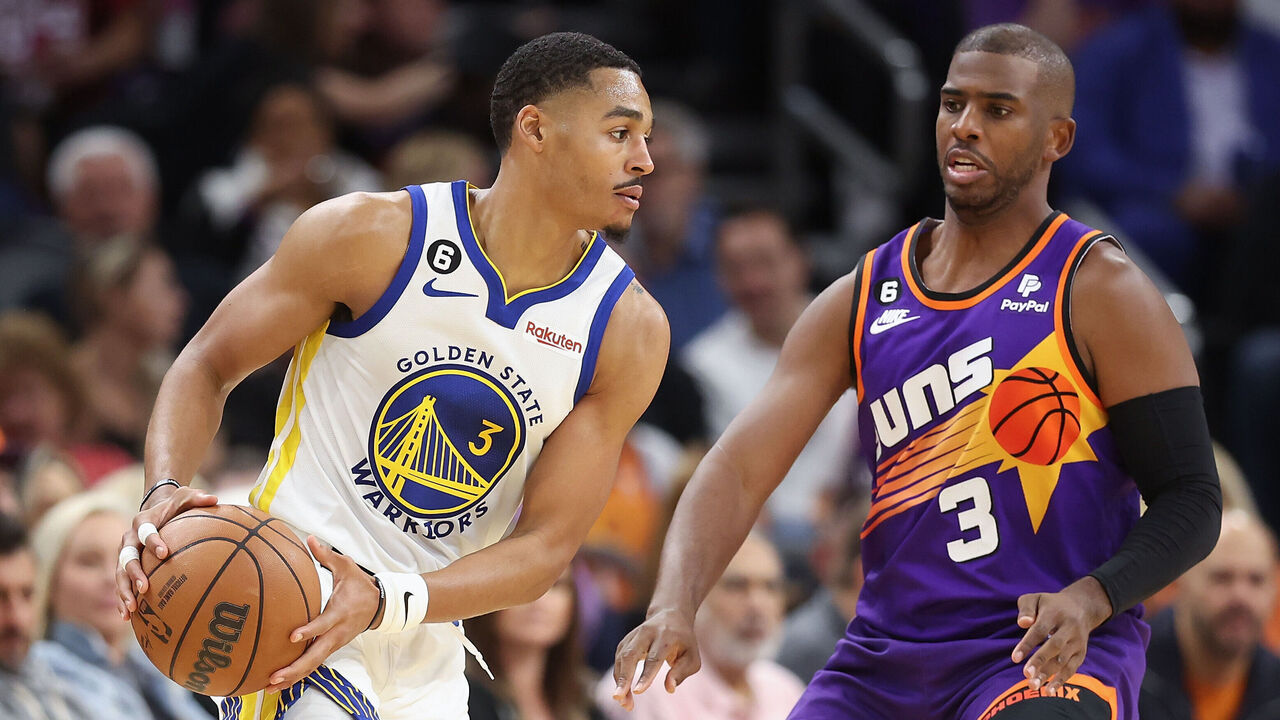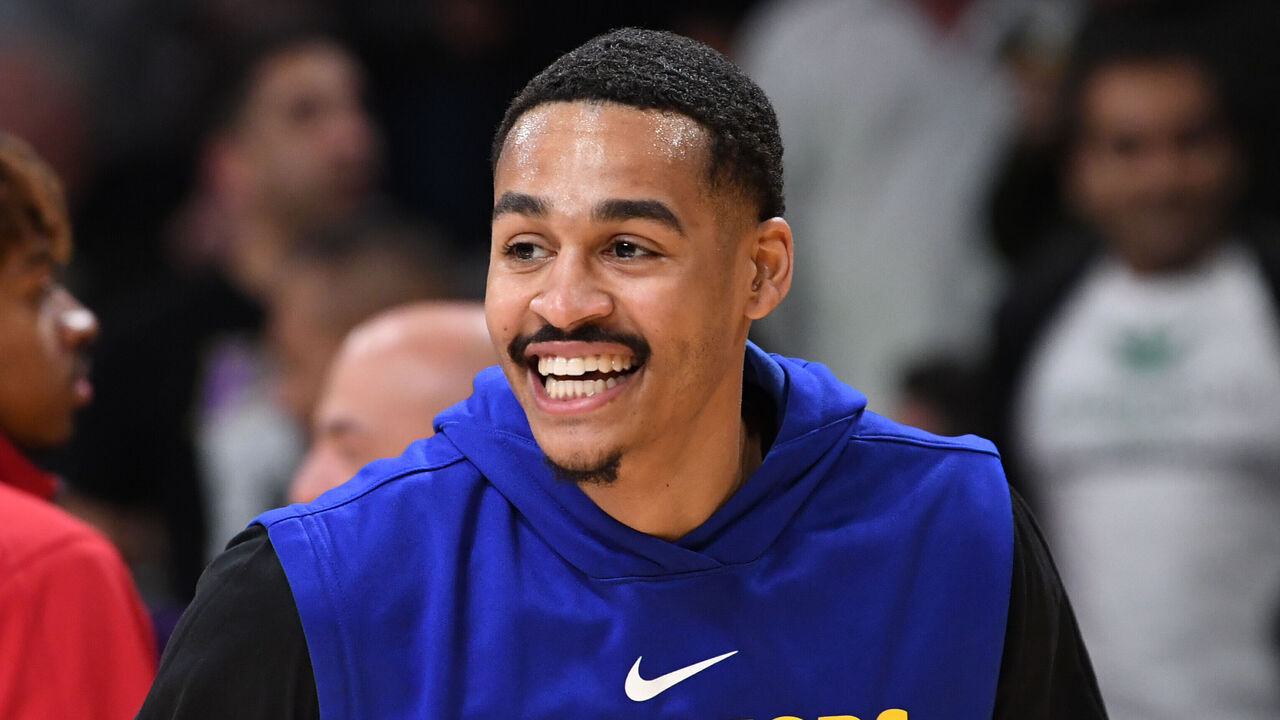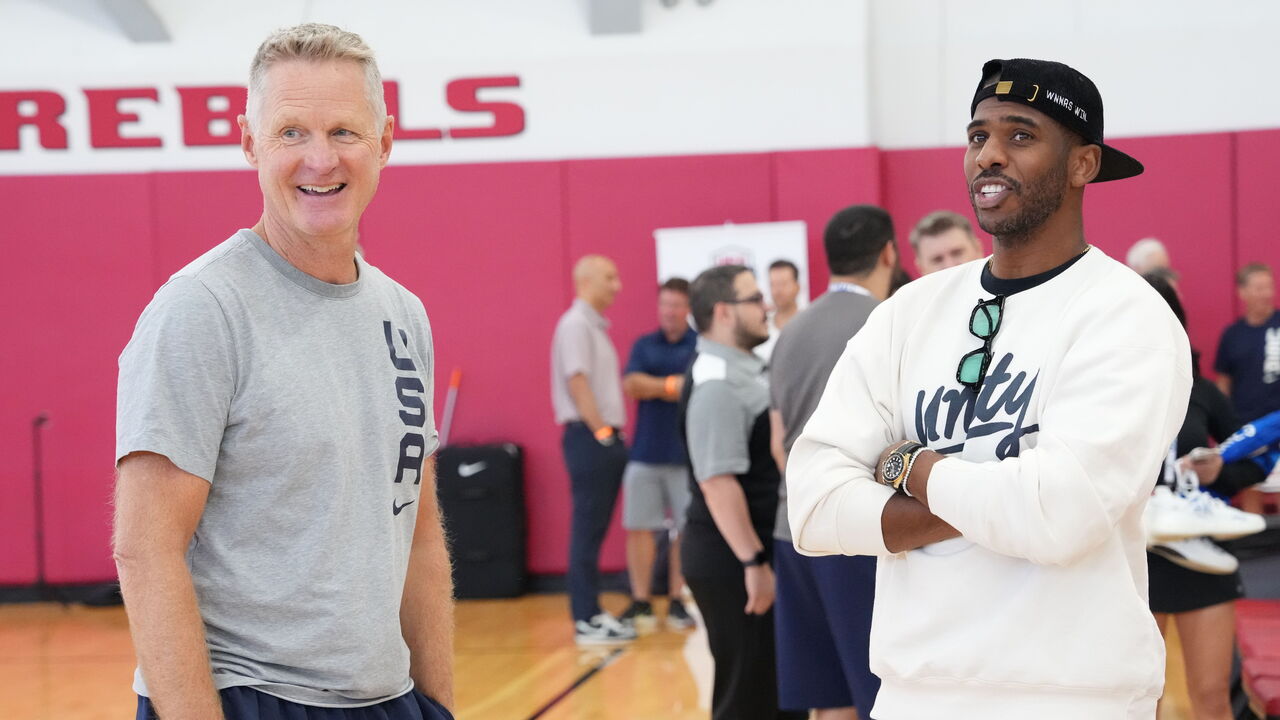Chris Paul and Jordan Poole are pursuing vindication in very different ways
With the 2023-24 campaign approaching, we're diving deep into some of the players we're most interested to watch. Next up, two players who just got traded for each other at very different points in their careers enter new situations with very different stakes and very different things to prove.
Previous entries: Austin Reaves; Victor Wembanyama and Chet Holmgren; Jaden McDaniels.
The Golden State Warriors signaled their intent to move away from their two-timelines approach at last season's trade deadline when they flipped James Wiseman (their then-21-year-old former No. 2 pick) for Gary Payton II (the 30-year-old undrafted journeyman they could've just re-signed the prior offseason).
But the job wasn't finished until this summer; they traded 24-year-old Jordan Poole - their biggest developmental success story of the last half decade - to the Washington Wizards in exchange for 38-year-old Chris Paul. In so doing, they essentially took a blowtorch to what remained of their bridge to the future.
The Wizards, by contrast, made a good-faith attempt to start building that kind of bridge. They'd acquired Paul from the Suns as part of the long-overdue Bradley Beal trade, and by rerouting him to the Bay, they made their return in that Beal deal look a lot more promising, even if the Warriors were treating Poole as a distressed asset.
The most interesting trades swap one talented player for another. Forget faraway draft picks or long-term projects; it's a lot more fun to see how two distinct players - whose relative value often lies in the eye of the beholder - reflect the shifting priorities and philosophies of their new teams. In this case, we're dealing with two teams at opposite ends of the competitive spectrum - circumstances that will allow Poole and Paul to seek vindication in completely different ways. It's a trade that has a chance to be a win for all parties involved.

Neither Poole nor the Warriors as a team managed to fully get their season back on the rails after Draymond Green socked Poole in the face during a training-camp scrimmage. At the time, it was unclear which one of them the organization would side with if their simmering conflict proved irreconcilable. That picture got even murkier when Poole signed a four-year, $140-million extension before the season started, while Green's impending free agency was left dangling throughout the year. But Poole's performance swiftly made his new deal look like an albatross, simplifying the front office's decision to trade Poole - which was ultimately Mike Dunleavy Jr.'s call in the wake of Bob Myers' departure.
Though Poole's flaws were exposed as the 2022 postseason rolled on, he still played a vital role in the Warriors' championship run, averaging 17 points on 65.4% true shooting. (Hence the big extension.) He represented a luxury the Steph Curry-era Warriors hadn't previously enjoyed: a second guard with the dynamism to not only shepherd the offense in Curry's stead, but to play alongside the team's stars and slingshot into their whirring off-ball actions as something of a Steph Lite. He also gave the team an isolation threat who was more than capable of dusting a switch or attacking without a screen. He was the fourth-most efficient iso scorer in the playoffs that year.
For whatever reason (interpersonal strife or otherwise), Poole never fully tapped back into the fluidity and decisiveness that defined his breakout campaign. He had sporadic flashes of brilliance but mostly spent the year living inside his own head, plagued by 3-point shooting funks, rushed decision-making, head-scratching turnovers, and porous point-of-attack defense. By the end of the second round, he was an afterthought in Golden State's playoff rotation.
That all sounds pretty rough, but Washington wisely bet that Good Poole is still in there somewhere. Talented, healthy players don't tend to suddenly forget how to excel in their early 20s, and Poole possesses an enviable set of tools for a rebuilding team. Guards who can create their own shot, know how to move off the ball, and get to the rim and the free-throw line a ton don't grow on trees. Even in a down year, Poole averaged 20.4 points on above-average efficiency and shot nearly 70% at the basket. Heck, he was the second-best off-the-dribble creator for the literal champs just over a year ago.
In other words, he was the perfect buy-low talent for a Wizards team in teardown mode. His defense and overall decision-making obviously need to be ironed out, but that's what a low-stakes environment is good for. This year will tell us a lot about the extent to which he's capable of cleaning up those issues. Did he simply need a change of scenery to rediscover his best self, or was the Warriors' ecosystem actually masking his limitations?

It's not like Poole didn't have freedom in Golden State - he had a 29% usage rate last year - but he'll take a different level of responsibility and offensive primacy in Washington. While he'll still compete for touches with both veterans (Tyus Jones, Kyle Kuzma, Delon Wright) and developing youngsters (Deni Avdija, Corey Kispert, Johnny Davis), he'll be easily the best creator on the team. There should be more consistency in terms of when and how he gets his touches. Unlike with the Warriors, he'll also play with a real rim-running roll man in Daniel Gafford. One would hope his playmaking capabilities can expand within that context.
It might not work out, but a team looking at kickstarting a rebuild with no foundational building blocks should bet on Poole's upside every time.
From the Warriors' end, the biggest impetus behind the trade might've been resolving the Poole/Draymond conflict and clearing Poole's contract off their books (Paul's entire 2024-25 salary is non-guaranteed), especially with the new CBA's second-apron spending penalties looming. But the trade also made sense as a present-day upgrade that could help maximize the twilight of Curry's prime as he enters his age-36 season.
Whether the move boosts Golden State's 2024 title chances is contingent on what Paul has left in the tank for his 19th NBA campaign. His decline to this point has been protracted but gentle, and he still nets out as a positive on both sides of the ball. He remains an excellent decision-maker, a dangerous mid-range scorer (he shot 50% from floater range and 46% on long twos last season), and a brilliant pick-and-roll playmaker who makes his teammates better. As one of the most intuitive players to ever lace them up, he should have no issue picking up the Warriors' offensive and defensive principles in short order.
But age has caught up with him in all the ways you'd have expected it to catch up to a guard of his stature a half-decade ago. He can't create separation, he can't beat anyone off the dribble, and he's a complete non-factor at the rim. He hit a grand total of 12 field goals inside the restricted area last season.
All of these things make him Poole's opposite, for better or worse. The Warriors are betting that what they're gaining in passing ability, defensive acuity, and veteran savvy will offset what they're losing in speed, off-the-bounce juice, and overall scoring punch. One particularly interesting angle: Paul has long been one of the most judicious guards in the league when it comes to taking care of the ball, which could be a boon to a team that's been a turnover machine for nearly a decade. That's also where we start to see the potential stylistic clash here.

Part of the reason the Warriors have been such a high-turnover team under Steve Kerr is that they play a fast, free-flowing, movement-heavy, read-and-react brand of basketball that can create a lot of wayward passes. Part of the reason Paul has been such a low-turnover guard is that he likes to walk the ball up the floor, micromanage possessions, and take only the most calculated of risks. How will Kerr reconcile those two philosophies? How will Paul? Will one win out, or will they meet somewhere in the middle? Is Paul even capable of meeting in the middle at this stage of his career?
Paul has never been the most active off-ball mover, and he's become especially sedentary in that regard now that he's the NBA equivalent of a senior citizen. It helps that he's still a good screener and spot-up shooter, but he won't be much of a movement shooting or cutting threat in a system that thrives on movement threes and backdoor cuts. Even his spot-up shooting isn't quite the weapon it appears to be. Sure, he sank a blistering 52.3% of his catch-and-shoot threes last regular season, but he did so on extremely low volume (just 88 attempts) because of his slow release and general shot aversion. That's why, despite his gaudy percentages, the Nuggets paid him almost no attention when he was spaced above the break during the teams' second-round playoff series.
That doesn't mean Paul can't play next to Curry - the former's playmaking precision and the latter's off-ball verve should be a fairly harmonious offensive fit - but it does make it sensible to stagger the two guards' minutes as aggressively as possible and let Paul run the show unencumbered when Curry is on the bench. That would likely mean leaning into pick-and-roll-oriented offense in a way Kerr's been reluctant to do in the past. It would also require someone like Jonathan Kuminga to emerge as a genuine roll threat to pair with Paul in those bench groups, since he'd mostly be seeing drop coverage.
Perhaps more than anything, it will require buy-in from Paul, who has started every single one of his 1,363 NBA games to date. His reaction to being asked about the possibility of coming off the pine in Golden State was eerily reminiscent of Carmelo Anthony laughing off the same suggestion in his introductory presser with the Thunder a few years back. But in reality, he makes a lot more sense as a sixth man than anyone from the Warriors' incumbent starting five. That wouldn't preclude the team from closing games with Paul on the floor and Green at center, but in the interest of maintaining size up front and preserving the aging Green, it's probably best to keep starting Kevon Looney.
Despite being a consummate professional who wins everywhere he goes, Paul remains ringless at the tail end of his career, and as a result hasn't quite shaken his undeserved reputation as a playoff underachiever. In recent years, it's really just been his health that's failed him in the postseason, which should give him that much more incentive to scale back his regular-season workload. Bottom line: This season may be Paul's last, best chance to claim that elusive championship, or at least to win one as anything more than a ring-chasing hanger-on. But doing so will require significant adaptation, compromise, and a continuing defiance of the standard aging curve.
I can't wait to see if he's up for it.
HEADLINES
- Campbell excited about new coordinators: Lions aren't 'starting from scratch'
- Patriots' McDaniels: 'Blessing' to take year off football
- Reds become 1st team since 1960 to lose 3 straight 1-0 games
- Bruins winless in 10 straight games after falling to Canadiens
- Giannis records historic 35-15-20 stat line in win over 76ers